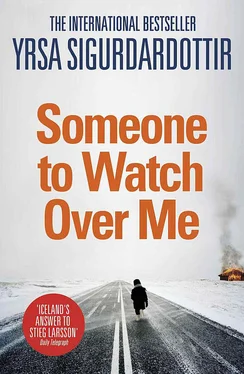‘Hopefully there isn’t generally a need to ask the sorts of questions that I just did.’
‘No. At least I’ve never been at that kind of interview before.’ The woman smiled, but her smile disappeared quickly as her teeth began to chatter. ‘Of course I’d heard of something similar happening at the National Hospital some decades ago, and then again recently at a community residence, but it was completely hushed up. A girl there became pregnant, but she died before further news of it got out. At least that’s how I heard it.’
‘I think the second story you’re referring to relates to the same case we were discussing with Ragna.’ Thóra was in a dilemma: she didn’t really want to speak to this woman, but she might need her services in the near future. It seemed clear that news of Lísa’s pregnancy had spread throughout the Regional Office, but had stopped there, since the woman had only heard secondhand rumours.
‘I’m bound to confidentiality about what I hear in these kinds of interviews. You needn’t worry that it will go any further.’ This sounded credible. The same applied to interpreting in court. Had Thóra been given time to prepare more thoroughly, this was one of the things she would have swotted up on, but now she had to decide whether the woman was telling the truth. ‘I’m trying to find the man who forced himself on one of the inhabitants of the care home that burned down. The woman was pregnant when she died in the fire and I suspect attempts have been made to cover this up.’
‘But what did she mean when she kept repeating the word oxygen?’
‘I have no idea, more’s the pity.’ This was one detail that had perplexed Thóra. When the girl had first spelled out the word, they had both thought she was in respiratory distress, which turned out not to be the case. How oxygen was related to the horrible thing that had happened to her was difficult to understand, but in the girl’s mind clearly the two were inextricably – if inexplicably – linked. ‘Did the description of the man mean anything to you?’ The likelihood that anyone would recognize the perpetrator from the description the girl had given was negligible: dark hair, blue-grey eyes, slim, straight teeth . Why couldn’t the bastard have had a wart or a tattoo in the middle of his forehead?
‘No, but I didn’t know anyone there. I never set foot in the residence, I’m afraid.’ The woman hopped from foot to foot. ‘What about the police? Shouldn’t you let them know?’
‘Yes, absolutely – I’ll contact them as soon as I get back to my office. It’s too cold to do it now.’ Even though the police had honoured Lísa’s parents’ request to keep her case quiet, the rape had taken on a different aspect now that it was clear there had been two victims – especially since one of them was still alive.
‘Sure, of course.’ The woman stood up straight and prepared to leave, even though she was obviously itching to ask Thóra more. It was probably as difficult for her to formulate her questions as it was for Thóra to digest what had happened.
‘One question before I go.’ Thóra sat on her hands again, this time to heat up her fingers a little before driving off. The wind blew into the car and the heater couldn’t compete. ‘Do you think you might have misread any of the cards? Might she have been trying to say something else? Those symbols are pretty close to each other, and it must be difficult to read them with absolute precision.’
‘No, that’s highly unlikely. I asked her about all of the symbols, as you saw, and she specifically agreed to those I pointed at. Obviously it’s harder to communicate through the cards than through standard spoken language; it’s impossible to have icons for everything in the world and communication becomes stilted when we have to spell out each word. But what I told you was what she indicated. I’ve been doing this long enough to assure you of that.’
‘I’m sorry. I was just hoping there would be some simple explanation for her bizarre responses. This thing about the oxygen is completely incomprehensible, and I have no idea what she was getting at when she mentioned the radio.’ Just before the girl had given up she had spelled out radio. ‘Of course she was probably trying to say something more about it, but I was hoping it might have been something else. Something clearer.’
‘No, sadly.’ The woman had turned blue from cold in the exposed car park. ‘But if I think of something, I’ll be in touch, of course.’ She gathered herself to leave again, but before she sprinted in the direction of her car she added: ‘You shouldn’t delay in contacting the police. People with locked-in syndrome usually die young, and she may not have long left. Death can strike quickly if the patient gets ill, and I know investigations and hearings take time. The person who did this mustn’t get away with it. She deserves to live to see him sentenced.’ And with that she ran off into the wind.
With the woman’s words ringing in her ears Thóra drove back up Skólavörðustígur Street, immensely relieved to have taken her car instead of walking the short distance, as she’d thought about doing. It wasn’t the north wind that made her jog in from her parking space, however, but the overwhelming desire to report what she’d learned to the authorities. With the same haste she called the police, before even removing her coat. She introduced herself and asked to speak to the person who had led the inquest into the fire. It would be best to speak to him so that she wouldn’t have to waste time explaining the facts of the case; he must have been aware of Lísa’s condition and the results of the investigation. After something of a wait, which at least gave her time to take off her jacket, a man came on the line, introducing himself in a deep voice as Úlfar. Thóra gave him her full name and was just about to tell him why she was calling when he interrupted her.
‘Did you say Thóra Guðmundsdóttir? Lawyer?’
Thóra was surprised. ‘Yes, that’s right.’
‘Has someone been in touch with you?’
This didn’t make things any clearer. ‘Er… no.’
The man was silent, apparently thinking things over. ‘Your name is on a list I have here in my office, in connection with a case that came up yesterday.’
‘I’m extremely busy, I’m afraid – I don’t have time to take on new cases at the moment. Could you take me off the list for the time being?’ A while ago Thóra had asked for her name to be added to a list of lawyers whom police suspects could contact when they needed a defence solicitor. This had been part of a plan that her partner Bragi had cooked up in response to the recession, although it hadn’t led to anything – until now, apparently.
‘It’s easier said than done to take you off the list that I’m talking about. No one here has requested legal assistance from you – this is to do with a very serious case that you seem to be linked to.’
Thóra was too taken aback to fully absorb the implications of what he was saying. ‘I don’t really understand. I actually called to report a serious crime. Perhaps we’re talking about the same thing?’ Had the therapist beaten her to it in reporting the rape?
‘If the crime you were going to report involves a death, then it’s possible. If not, then we’re talking about two unrelated cases.’
‘A death?’ Thóra’s heart skipped a beat; maybe Jakob had died of his wounds. He hadn’t seemed to be anywhere near death’s door the day before, but what did she know about medicine? ‘What’s the name of the person who died, may I ask?’
Rather than answering her, he changed the subject, or so it seemed. ‘Do you know a young radio host named Margeir?’
Читать дальше












